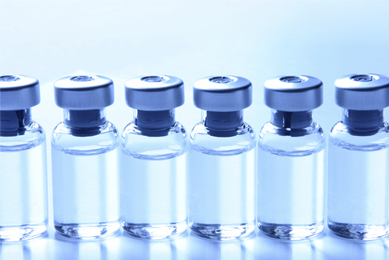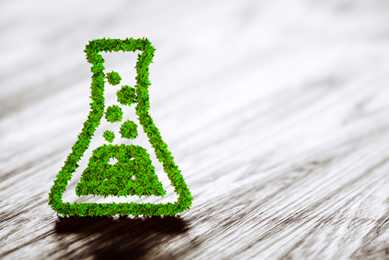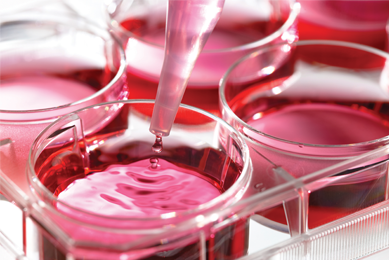Industrial biomanufacturing exploits biological processes to manufacture fuel, food ingredients, and chemical products, decreasing reliance on petroleum or petrochemicals as starting materials.1,2 ATCC offers a variety of microbial strains to aid in these efforts, including those involved in the production of antibiotics, organic acids, and biofuels. These strains, combined with ATCC’s reference-quality ‘omics data available through the ATCC Genome Portal, allow scientists to design and potentially develop biochemical production pathways that do not currently exist2 or augment existing pathways to enhance biochemical production. ATCC has paired with Capra Biosciences in support of the Defense Advanced Research Projects Agency (DARPA)’s Switch program to develop reprogrammable biosystems for the production of diverse carbon-containing products without the use of petroleum or petrochemicals.3
Biomanufacturing using consistent and high-quality biological materials is essential for driving efficiencies in combating both infectious and chronic diseases. ATCC plays a crucial role in biomanufacturing through its expertise in sample collection, processing, authentication, and storage of biological material. Currently, ATCC is constructing a new facility at its headquarters in Manassas, Virginia, that will provide critical biological manufacturing capabilities, including biological standards and well-characterized challenge material to accelerate translational research for therapeutic and diagnostic development. In the chronic disease research space, ATCC supports programs such as the Human Cancer Models Initiative, for which ATCC manufactures 3-D human cancer models and serves as the sole distributor to global researchers. ATCC has also been selected by The Michael J. Fox Foundation for Parkinson’s Research to provide vital cell lines to academic, pharmaceutical, and biotechnology organizations committed to finding a cure for Parkinson’s disease. ATCC provides standardized reference materials, including human adenovirus type 5 reference material (ATCC® VR-1516™- Coming soon) and lentivirus vector reference material (ATCC® VR-3382™ – Coming soon), for research use in the manufacturing of engineered viruses, like adenovirus and lentivirus vectors, to deliver therapeutic genes.
ATCC’s biomanufacturing efforts have also expanded to include regenerative medicine, focusing on repairing or replacing damaged tissue.4 Through tissue engineering, ATCC’s collection of standardized cells is being used by researchers in conjunction with three-dimensional scaffolds to generate functional tissues.4,5 The therapeutic effects of stem cells, another key component of regenerative medicine, are now believed to be largely attributed to the immunomodulatory and reparative properties of their secreted extracellular vesicles (EVs).6,7 For example, mesenchymal stromal cell (MSC)-derived EVs have been shown to protect against cardiac, renal, and pulmonary injuries, promote wound healing, support hepatic regeneration, and aid in central nervous system repair.8,9 This makes MSC-derived EVs a highly attractive off-the-shelf, cell-free option for regenerative medicine, potentially offering more effective, safer, and cost-efficient treatments.10 ATCC offers five EV products in its collection, including EVs from hTERT-immortalized MSCs (ATCC® SCRC-4000-EXM™), as well as related resources.
By providing high-quality bioresources and participating in collaborative initiatives, ATCC catalyzes groundbreaking advancements that help address pressing medical and environmental challenges. Learn more about these advancements in our short video: Catalyzing the Bioeconomy.
Did you know?
ATCC is actively shaping the future of biomanufacturing by participating in various consortiums like BioFabUSA, NIIMBL, and BioMap. Their involvement spans regenerative medicine, biopharmaceutical manufacturing, and cell and gene therapy, contributing significantly to technological advancements in these fields.
Meet the authors
Sonia Bjorum Brower, PhD
Technical Manager, ATCC
Dr. Bjorum Brower leads AFS Authentication, a team consisting of ten technical writers, overseeing the authentication and documentation of reagents for several federal contracts. Dr. Bjorum Brower joined the team in 2013 as a Senior Technical Writer, responsible for the technical review, authentication, and accurate documentation of produced reagents. During this time, she was also involved in the development of a sequencing and bioinformatics center and assisted in the development of a new product line. Her role expanded following a promotion to Lead Technical Writer in 2018, in which she supervised a team of technical writers and coordinated interdepartmental collaboration. Sonia earned a PhD in Cellular Biology and Biochemistry from Rice University, where her dissertation focused on the roles of genes in neural development and fertility of Drosophila species, and a BS in Health Sciences from Purdue University. Additionally, she was an instructor at Lee College and has multiple publications in the field of genetics and neurobiology.
Baisali Ray, PhD
Senior Technical Writer, ATCC
Baisali is a Senior Technical Writer at ATCC. She holds both a Master and a PhD in Physiology from All India Institute of Medical Sciences, with publications in the neurophysiology of sleep. In the Authentication department of ATCC Federal Solutions, she is involved in all aspects of the authentication process, from scientific literature review and quality analysis of data to the preparation and inspection of technical documents for a wide variety of bacterial, protozoan, and viral infectious disease reagents. Prior to joining ATCC, she taught anatomy and physiology for nearly a decade as an adjunct assistant professor at Northern Virginia Community College and Prince George’s Community College, following her postdoctoral research positions at the University of Maryland, College Park, and the University of Iowa.
Explore our featured resources

Bioproduction
Explore our credible resources for industrial bioprocessing and cell-based applications.
More
Microbial bioproduction
Achieve the sustainable production of commercially and clinically relevant chemicals with authenticated microorganism from ATCC.
More
Biologics Production
ATCC provides a variety of products that support the development and sterility testing of biologics.
MoreReferences
- Heux S, et al. White Biotechnology: State of the Art Strategies for the Development of Biocatalysts for Biorefining. Biotechnol Adv. 33(8): 1653-1670, 2015. PubMed: 26303096
- Schmidt-Dannert C. The Future of Biologically Inspired Next-Generation Factories for Chemicals. Microb Biotechnol 10(5): 1164-1166, 2017. PubMed: 28805317
- DARPA. Bringing Programmability and Long-Term Stability to Biomanufacturing Processes, https://www.darpa.mil/news/2024/programmable-biomanufacturing. Accessed 11MAR2025.
- Angelo MS, Mooney DJ. Regenerative Medicine: Current Therapies and Future Directions. Proc Natl Acad Sci U S A 112(47): 14452–14459, 2015. PubMed: 26598661
- Antezana PE, et al. The 3D Bioprinted Scaffolds for Wound Healing.” Pharmaceutics. 14(2): 464, 2022. PubMed: 35214197
- Deng Hao, et al. Lipid, Protein, and MicroRNA Composition Within Mesenchymal Stem Cell-Derived Exosomes. Cellular Reprogram 20(3): 178-186, 2018. PubMed: 29782191
- Kou M, et al. Mesenchymal Stem Cell-Derived Extracellular Vesicles for Immunomodulation and Regeneration: A Next Generation Therapeutic Tool? Cell Death Dis 13(7): 580, 2022. PubMed: 35787632
- Zhang B, et al. Focus on Extracellular Vesicles: Therapeutic Potential of Stem Cell-Derived Extracellular Vesicles. Int J Mol Sci 17(2):174, 2016. PubMed: 26861305
- Branscome H, et al. Use of Stem Cell Extracellular Vesicles as a ‘Holistic’ Approach to CNS Repair. Front Cell Dev Biol 8: 455, 2020. PubMed: 32587858
- Zhang B, et al. Focus on Extracellular Vesicles: Therapeutic Potential of Stem Cell-Derived Extracellular Vesicles. Int J Mol Sci 17(2): 174, 2016. PubMed: 26861305